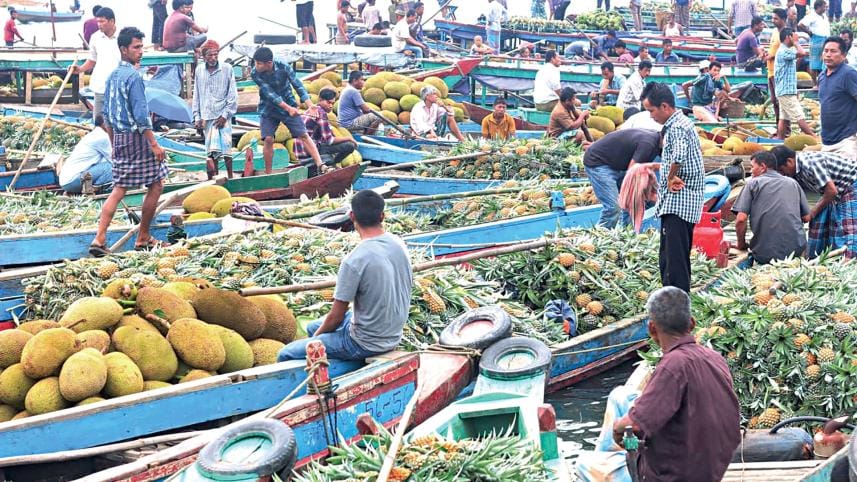Despite good yield, growers not all smiles

In hopes of higher profits, pineapple farmers in Rangamati had planted saplings of the summer fruit this winter.
While the yield has been satisfactory, the market demand for the fruit remains low, compelling the cultivators to sell their produce for lower prices.
During a recent visit to Naniarchar upazila, this correspondent saw pineapple plantations booming with freshly ripe fruits. However, the farmers' faces wore a gloomy look.
According to the Directorate of Agricultural Extension, pineapple was cultivated on 2,130 hectares of land this year, yielding a total of 55,913 tonnes of the fruit.
Bangladesh is listed as one of the top 10 pineapple producers around the world, with honey queen, a variety from the hills, playing a pivotal role in establishing this agricultural trademark.
Despite substantial pineapple production in Rangamati every year, farmers complain of being deprived of fair prices even after bumper harvests, attributing the cause of their losses to the absence of proper storage facilities.
Grown on hill slopes, the process of bringing the fruits to the markets from the orchards located in remote mountainous regions is a rather tedious task for the cultivators, mentioned farmer Dulal Gazi.
"The price we are getting after overcoming such hardships is disheartening," he added.
Farmer Nabin Kumar Chakma of Naniarchar said, "Rains are a frequent in the months of Baishakh and Jaishtha, leading to landslides along the slope. Thus, we resorted to off-season cultivation. However, the market demand doesn't always align with our expectations."
Farmer Arif Mia added, "I planted 25,000 saplings, investing Tk 70,000. I have to spend at least Tk 600 daily in labour costs. The produce has to be taken on a boat, and its rent further adds to the expenses."
He said he has to sell each fruit for Tk 10, much less then its production cost.
Wholesale trader Abul Mia attributed the increased cost of transportation and low market demand for this imbalance.
Contacted, Moniruzzaman, deputy director of DAE in Rangamati, "Due to cultivating pineapple before its preferred season, the fruits are not as sweet. With no available resource to store the produce, farmers are now exposed to greater risks."



 For all latest news, follow The Daily Star's Google News channel.
For all latest news, follow The Daily Star's Google News channel.
Comments